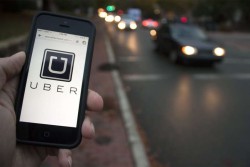Top Class Actions’s website and social media posts use affiliate links. If you make a purchase using such links, we may receive a commission, but it will not result in any additional charges to you. Please review our Affiliate Link Disclosure for more information.

While a settlement for $100 million in one case sounds like it would be end game, at least one plaintiff is continuing a legal battle, saying the terms of that settlement do not go far enough to compensate nor protect Uber drivers.
Independent Contractors vs. Employees
More than 300,000 people are employees of Uber in the state of California. Because the employees are classified as independent contractors, Uber has not had to reimburse them for car maintenance, tolls, health insurance or gas.
By keeping the drivers from becoming direct employees, Uber avoids paying unemployment insurance, Social Security, workers’ compensation and other benefits.
Uber drivers have filed various class action lawsuits alleging they are not paid a living wage, and that they are treated as employees and not as independent contractors.
Uber identifies itself as a “technology company”; its full name is Uber Technologies, Inc. As such, Uber claims it provides a technological bridge between people who need a ride and drivers who are willing to provide transportation.
Because customers request a ride via the Uber mobile application, Uber insists it is a technology company and not a transportation company.
Uber drivers call foul with this explanation, claiming that Uber is simply trying to avoid the umbrella of expensive labor laws that would cover employees if they were not independent contractors.
In one recent decision in a San Francisco Uber driver class action lawsuit, U.S. District Judge Edward Chen ruled that Uber “would not be a viable business entity without its drivers…. Uber’s revenues do not depend on the distribution of its software, but on the generation of rides by its drivers.”
In that case, the Uber driver was declared an employee and Uber was ordered to reimburse her $4,000 in expenses.
The $100 Million Question
Even though Uber has agreed to pay $100 million and make numerous policy changes in a couple of class action lawsuits with drivers in California and Massachusetts, some drivers say the terms do not go far enough because drivers will still be classified as independent contractors and not as employees.
Despite the large payout and policy concessions, most see the settlement as a victory for Uber because of their ability to keep drivers as independent contractors.
In addition to the monetary payout, Uber will be obligated to the following:
- Amend its practice of deactivating drivers from the app with little warning or recourse
- Warn drivers before removing them from the service
- Allow drivers to post signs requesting tips in their vehicles
- Form a driver’s association in both states to meet quarterly and address issues
Uber will also better communicate to drivers regarding their ratings, how they compare to other drivers, and clarify what conditions can get drivers banned.
While previously, drivers could be deactivated without explanation, Uber must now give cause for such termination.
Attorney Under Fire
Upon the announcement of the $100 million deal, the plaintiffs’ attorney Shannon Liss-Riordan issued the following statement:
“We believe these to be very significant changes that will improve work conditions for Uber drivers.”
Plaintiff Douglas O. disagrees with her, and claims Liss-Riordan did not fully disclose the terms of the settlement. He insists he did not know he had a right to refuse the settlement, which he felt pressured into signing.
Douglas says the main reason he filed the Uber class action suit was to force the company to consider Uber drivers employees instead of independent contractors.
He claims he would have rejected the $100 million settlement because Uber still is allowed to classify employees as independent contractors.
New lawyers for Douglas, Mark Geragos and Brian Kabateck, have filed a motion to have Liss-Riordan removed from the class action lawsuit, alleging she acted in collusion with Uber to reach a monetary settlement that benefited her personally, but did not assist the plaintiffs.
Geragos believes the settlement should have been closer to $1 billion.
Liss-Riordan calls that figure “a little outrageous.”
The Uber Driver Class Action Lawsuits are O’Connor et al. v. Uber Technologies Inc. et al., Case No. 3:13-cv-03826, and Hakan Yucesoy v. Uber Technologies Inc. et al., Case No. 4:15-cv-00262, both in the U.S. District Court for the Northern District of California.
UPDATE: May 2019, the Calif., Mass., Uber driver misclassification class action settlement is now open. Click here to file a claim.
Join a Free California Uber Driver Class Action Lawsuit Investigation
If you are an California Uber driver, you may be eligible to join a class action lawsuit investigation into claims they you were misclassified as independent contractors. Find out if you qualify.
ATTORNEY ADVERTISING
Top Class Actions is a Proud Member of the American Bar Association
LEGAL INFORMATION IS NOT LEGAL ADVICE
Top Class Actions Legal Statement
©2008 – 2024 Top Class Actions® LLC
Various Trademarks held by their respective owners
This website is not intended for viewing or usage by European Union citizens.
Get Help – It’s Free
Join a Free California Uber Driver Lawsuit Investigation
An attorney will contact you if you qualify to discuss the details of your potential case.
Please Note: If you want to participate in this investigation, it is imperative that you reply to the law firm if they call or email you. Failing to do so may result in you not getting signed up as a client, if you qualify, or getting you dropped as a client.
Email any problems with this form to questions@topclassactions.com.
Oops! We could not locate your form.












